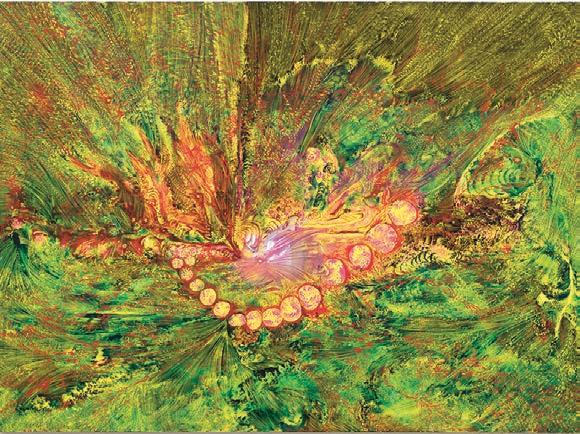
2 minute read
REVIEW: Lucy Bull David Kordansky Gallery
from PRIVATE PROPERTY
by artillerymag
By Shana Nys Dambrot
There almost certainly are figures both human and animal, as well as a plenitude of botanical, arboreal, avian and possibly extraterrestrial apparitions inhabiting and defining the landscape-like spaces of Lucy Bull’s paintings. But closer contemplation makes it pretty clear that it has been the mind of the viewer which has placed them there, rather than the hand of the artist. Bull’s palette also lends itself to neuro-optical shenanigans, as its exponential hyper-artificiality collides with an intense experience of florid, fecund nature. Bull depoys a chromatic juggernaut featuring the radiant yellow-green of new spring buds, the sickly rosy-red flush of wounds, cool mint of magic hour breezes, emerald and teal prisms of oil slicks and ostrich feathers, explosive yellow of solar flares and astral smatterings like the pale lavender of wildflowers. This shifting kaleidoscope is further activated by her array of studio techniques, so that the multivalent texture of every centimeter of surface is alive in its own unique gathering of strokes, streaks, pools, drips, smears, daubs, swirls, slashes, dashes and the most exquisite feathering. Looking at these oil paintings on linen, like the majestic Stinger and the courtly Permission (both 2021), the optical effect is

Lucy Bull,The Bottoms, 2021, courtesy of David Kordansky Gallery, Los Angeles, photo by Jeff McLane.
like a zoom lens on the camera inside your eye—it seems to reach off the wall, there’s a bit of vertigo and the feeling of falling into the pictorial space. Soon the edges of the compositions pass by your peripheral vision and the massiveness of its flourishing detail envelops your field of sight and you are all the way down in there, inside the deep space of phosphorescent galaxies. In Evening Switch (2021) there’s a sense of a classical grotto, a decadent place of Dionysian romping with tame peacocks, grape-laden trellises and secret magic. The dark heart of the image pulls the viewer’s body closer; the eye wishes to more fully enter and explore, to see in the dark. The most charismatic work of the exhibition is The Bottoms (2021), whose operatic melodrama is built on the tension between chartreuse and fuschia. The supernova center and string of fireball pearls both anchor and disrupt its expansive picture plane; the many forms of brushwork generate a universe of image and detail—but there is nowhere to rest the eye and nothing is finitely rendered. Neither reliably narrating nor entirely avoiding the phenomenological world, the work’s true subject is painting itself—both a scientific inquiry into the physical properties and behaviors of paint as a material, and a more esoteric, mindful investigation of painting as a way of expressing the inexpressible splendor of existence.










